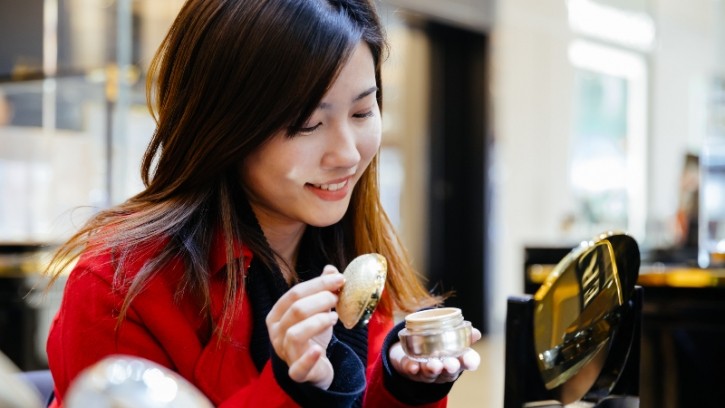‘From fad to long-term trend’: China grants licence for in-store personalised cosmetics services to L’Oréal, Estée Lauder

A SkinCeuticals store in Shanghai was recently granted a licence for on-site personalised services — first of its kind in the country — by the Shanghai Municipal Medical Products Administration (MPA), representing a significant breakthrough for China’s personalised cosmetics industry.
The National Medical Products Administration (NMPA) had announced in November 2022 the launch of a one-year pilot project for personalised cosmetics services in five cities, namely Beijing, Shanghai, Zhejiang, Shandong, and Guangdong.
Other companies that have been selected for the pilot in Shanghai include Estée Lauder and Shanghai Chuangyuan Cosmetics.
With this license, retail stores could act as mini cosmetics factories, where consumers are able to personalise and receive custom-made products on the spot.
“Brands can quickly customise products by creating the formulation and emulsifying etc. in store. Other on-site personalised services include sub-packaging and packaging of cosmetic contents within the business premises,” said Hedy He, Cosmetic Regulatory Analyst at ChemLinked.
For instance, SkinCeuticals’ on-site equipment integrates laboratory formula blending with factory production methods. Eight preprepared formulas that can be made into dozens of unique formulations are available to be tailored to each consumer’s skin condition.
To produce a bottle of personalised essence, production and quality inspection staff work together to input the appropriate data into the blending instrument, which then mixes the customised formula at a rapid speed of 1,200 times per minute.
When completed, the formula and consumer’s name are printed and labelled on the bottle.
According to Liang Xue, General Manager of China’s EasyCare Group, the introduction of the pilot project has led numerous companies to conduct related research. She believes that personalised cosmetics is set to become a trend in 2023.
Hurdles to cross
However, it should be noted that the current license is limited to small-scale production of makeup and skin care with simple functions, such as moisturising.
Products with more complex functions like whitening are considered as “high risk”, and are not eligible at the moment.
At the same time, cosmetics firms need to overcome the challenges of different production environment in stores and factories.
“Many industry experts are concerned about how to achieve strict quality and safety control in stores with limited space. Nevertheless, Shanghai MPA appears to be confident about the future of cosmetics personalised services.
“Under the guidance of National Medical Products Administration (NMPA), Shanghai MPA will continue to improve on-site personalised services management rules, and transform this new business format from a fad to a long-term trend,” He shared.
Big players’ advantage
The concept of cosmetics personalisation has been discussed for years in China, with Shanghai at the forefront of this movement.
In August 2022, Shanghai MPA implemented “Several Provisions on the Innovative Development of Cosmetics Industry in Shanghai Pudong New Area” to encourage cosmetics firms to adopt small-batch, multi-variety, and highly flexible production models.
This approach allows for the development of products that meet the individual needs of consumers.
As a pilot city, Shanghai released the “Regulation for On-site Personalised Service Review of General Cosmetics in Pudong New Area (Trial)” for public consultation in April 2023.
It outlines the stringent requirements to obtain the license, such as product notification, while serving to enhance regulatory measures for quality and safety risk control, and operational processes concerning on-site personalised services.
“As the personalised cosmetics market continues to grow, it is expected that more companies will be granted this license in the future. However, personalised services require a certain level of technical expertise and corporate strength. Therefore, the NMPA has set a strict selection criteria for pilot firms,” said He.
Specifically, companies must have independent production and strong R&D capacity; good reputation; and comprehensive product traceability, production quality management systems, and after-sales service capabilities.
In addition, no non-compliant products must be found during supervision and inspection processes, and no administrative penalties must be imposed by the local MPA in the past three years.
“Smaller enterprises may not have the ability to meet the selection criteria. Currently, the approved list of companies in Shanghai includes internationally renowned firms such as L’Oréal and Estée Lauder. It is likely that leading companies in the industry will obtain the licenses sooner.”
![MoCRA could complicate entry into the US beauty market for Asian cosmetic companies, says a regulatory expert. [Getty Images]](https://www.cosmeticsdesign-europe.com/var/wrbm_gb_food_pharma/storage/images/_aliases/wrbm_medium/publications/cosmetics/cosmeticsdesign-asia.com/headlines/regulation-safety/mocra-regulations-what-asia-s-beauty-firms-need-to-know-about-us-s-landmark-law/16601820-1-eng-GB/MoCRA-regulations-What-Asia-s-beauty-firms-need-to-know-about-US-s-landmark-law.jpg)
![Symrise is on the search to identify a homegrown brand that could redefine China’s fine fragrance landscape. [Symrise]](https://www.cosmeticsdesign-europe.com/var/wrbm_gb_food_pharma/storage/images/_aliases/wrbm_medium/publications/cosmetics/cosmeticsdesign-asia.com/headlines/market-trends/symrise-aims-to-unearth-mega-brand-potential-in-china/16482971-1-eng-GB/Symrise-aims-to-unearth-mega-brand-potential-in-China.jpg)
![Generative artificial intelligence (AI) has the potential to transform the beauty industry by empowering consumers and fostering innovation. [Getty Images]](https://www.cosmeticsdesign-europe.com/var/wrbm_gb_food_pharma/storage/images/_aliases/wrbm_medium/publications/cosmetics/cosmeticsdesign-asia.com/headlines/market-trends/how-generative-ai-will-influence-the-future-of-beauty/16446746-1-eng-GB/How-generative-AI-will-influence-the-future-of-beauty.jpg)
![Watsons is focusing digital marketing efforts on WeChat to stay connected and build communities with its consumer base. [Watsons]](https://www.cosmeticsdesign-europe.com/var/wrbm_gb_food_pharma/storage/images/_aliases/wrbm_medium/publications/cosmetics/cosmeticsdesign-asia.com/headlines/brand-innovation/watsons-china-centres-digital-strategy-around-wechat-ecosystem-to-stay-connected-with-shoppers/16424957-1-eng-GB/Watsons-China-centres-digital-strategy-around-WeChat-ecosystem-to-stay-connected-with-shoppers.jpg)


![Chinese study highlights mental health challenges in atopic dermatitis, emphasising holistic patient care. [Getty Images]](https://www.cosmeticsdesign-europe.com/var/wrbm_gb_food_pharma/storage/images/_aliases/wrbm_tiny/publications/cosmetics/cosmeticsdesign-asia.com/headlines/formulation-science/chinese-research-linking-atopic-dermatitis-to-mental-health-underscores-need-for-holistic-care/17040623-1-eng-GB/Chinese-research-linking-atopic-dermatitis-to-mental-health-underscores-need-for-holistic-care.jpg)





